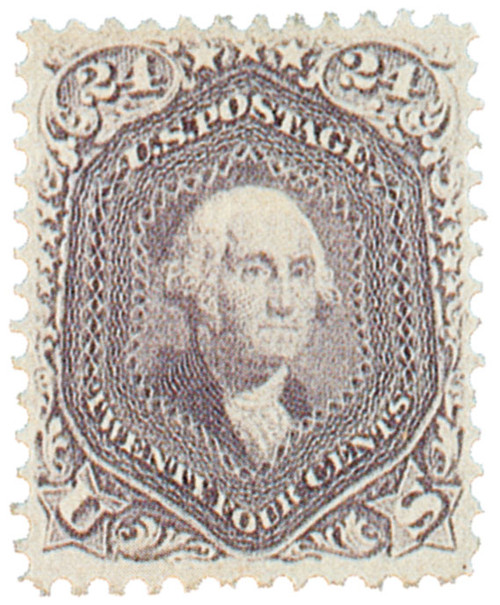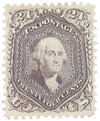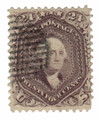
# 70 - 1861-62 24c Washington, red lilac
U.S. #70
1862 Washington
- Replaced previous 24c stamp after it was demonetized
- Paid double letter rate to Great Britain
- Many color varieties exist
Stamp Category: Definitive
Series: 1861-62 Issue
Value: 24c
Earliest Documented Use: January 7, 1862
Printed by: National Bank Note Co. Quantity printed: 400,000 estimated
Format: Printed in sheets of 200 stamps, divided into vertical panes of 100 each
Printing Method: Engraving
Perforations: 12
Color: Red lilac
Why the stamp was issued: The stamp was issued to take the place of the 24c stamp of the 1857-61 series, which had been demonetized by the US Post Office Department. The 24¢ Washington stamp paid the double letter rate to Great Britain.
About the printing: The design was engraved on a die – a small, flat piece of steel. The design was copied to a transfer roll – a blank roll of steel. Several impressions or “reliefs” were made on the roll. The reliefs were transferred to the plate – a large, flat piece of steel from which the stamps were printed.
About the design: The image of Washington is based on a portrait by renowned artist Gilbert Stuart. Stuart painted at least 100 portraits of Washington.
About the 1861-62 Series: The series consists of US #63-72. The same face values and subjects found in the 1857-61 series were used in their creation, and their colors are similar as well. The frame designs vary greatly from the preceding series. While the denominations on the 1857-61 issues were written out, the denominations on the new series were now also shown in numerals displayed in the upper corners of the stamps. This helped distinguish them from the previous series.
History the stamp represents:
The 24c value replaced the same denomination in the prior series of U.S. stamps (1857-61). The earlier stamps were declared invalid for postage on June 1, 1861.
Due to the outbreak of the Civil War, all US stamps were demonetized, thereby preventing the Confederate States of America (CSA) from selling them in the North and using the money to support the Southern war effort.
The new 1861 stamps were sent to post offices along with a notice that required an exchange period of six days be announced in local newspapers. During the exchange period, old stamps could be exchanged for new ones. After the six-day exchange period, the old stamps were no longer accepted as postage.
U.S. #70
1862 Washington
- Replaced previous 24c stamp after it was demonetized
- Paid double letter rate to Great Britain
- Many color varieties exist
Stamp Category: Definitive
Series: 1861-62 Issue
Value: 24c
Earliest Documented Use: January 7, 1862
Printed by: National Bank Note Co. Quantity printed: 400,000 estimated
Format: Printed in sheets of 200 stamps, divided into vertical panes of 100 each
Printing Method: Engraving
Perforations: 12
Color: Red lilac
Why the stamp was issued: The stamp was issued to take the place of the 24c stamp of the 1857-61 series, which had been demonetized by the US Post Office Department. The 24¢ Washington stamp paid the double letter rate to Great Britain.
About the printing: The design was engraved on a die – a small, flat piece of steel. The design was copied to a transfer roll – a blank roll of steel. Several impressions or “reliefs” were made on the roll. The reliefs were transferred to the plate – a large, flat piece of steel from which the stamps were printed.
About the design: The image of Washington is based on a portrait by renowned artist Gilbert Stuart. Stuart painted at least 100 portraits of Washington.
About the 1861-62 Series: The series consists of US #63-72. The same face values and subjects found in the 1857-61 series were used in their creation, and their colors are similar as well. The frame designs vary greatly from the preceding series. While the denominations on the 1857-61 issues were written out, the denominations on the new series were now also shown in numerals displayed in the upper corners of the stamps. This helped distinguish them from the previous series.
History the stamp represents:
The 24c value replaced the same denomination in the prior series of U.S. stamps (1857-61). The earlier stamps were declared invalid for postage on June 1, 1861.
Due to the outbreak of the Civil War, all US stamps were demonetized, thereby preventing the Confederate States of America (CSA) from selling them in the North and using the money to support the Southern war effort.
The new 1861 stamps were sent to post offices along with a notice that required an exchange period of six days be announced in local newspapers. During the exchange period, old stamps could be exchanged for new ones. After the six-day exchange period, the old stamps were no longer accepted as postage.















